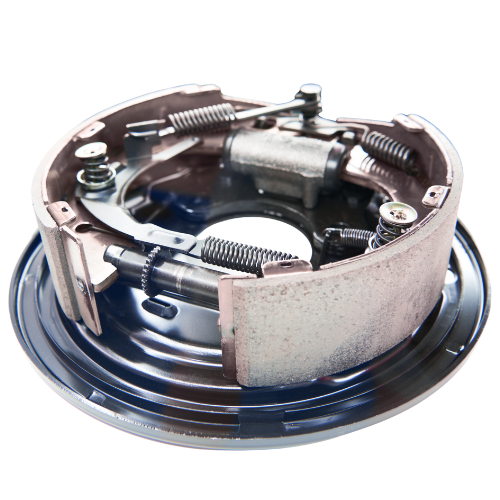Explore the four key components that make up a truck’s brake system—engineered to ensure safe, reliable, and powerful stopping performance on every road.

Selecting high-quality brake calipers ensures durability, improved braking power, and reduced maintenance costs. This guide provides essential insights into what makes a great brake caliper, key features to look for, and how to choose the best option for your heavy-duty truck or fleet.
1. Understanding the Role of Brake Calipers in Heavy-Duty Vehicles
Brake calipers are part of the disc braking system, which is increasingly used in heavy-duty trucks, buses, and trailers due to its superior stopping power and heat dissipation.
How Brake Calipers Work:
Why Brake Calipers Matter in Heavy-Duty Applications:
Pro Tip: Heavy-duty trucks often use air disc brake calipers for superior performance compared to traditional drum brakes.
2. Key Features of High-Quality Brake Calipers
When selecting brake calipers for a heavy-duty application, consider the following essential factors:
2.1 Material and Durability
Fact: Corrosion is a major cause of brake caliper failure—opt for zinc-coated or electroplated calipers to prevent rust.
2.2 Piston Quality
2.3 Heat Dissipation and Performance
2.4 Compatibility with Brake Pads and Rotors
Pro Tip: Pairing high-quality calipers with premium brake pads ensures consistent braking power and reduces downtime.
3. Choosing the Right Brake Calipers for Your Truck or Fleet
3.1 Consider Your Application
Different industries require different braking performance levels.
ApplicationRecommended Brake TypeKey Features to Look For Freight TransportAir disc brake calipersCorrosion-resistant, durableConstruction TrucksHeavy-duty cast iron calipersMulti-piston, dust-sealed Mining EquipmentOversized calipers with heat-resistant padsHigh heat toleranceEmergency VehiclesHigh-performance disc brake calipersFast response, low fade
Example: A long-haul freight truck carrying heavy loads needs calipers with excellent heat dissipation, whereas a construction truck requires reinforced calipers that withstand dust and debris.
3.2 OEM vs. Aftermarket Calipers
OEM (Original Equipment Manufacturer) Calipers:
✔ Designed specifically for your truck model.
✔ Manufactured to meet factory standards.
✔ Typically more expensive but reliable.
Aftermarket Calipers:
✔ Often more affordable with a variety of performance options.
✔ Available from reputable brands with high safety ratings.
✔ Quality varies—stick to certified manufacturers for best results.
Pro Tip: Look for SAE and IATF16949 certification when buying aftermarket brake calipers to ensure compliance with industry safety standards.
4. Common Brake Caliper Issues and How to Prevent Them
Even high-quality brake calipers require regular maintenance to ensure longevity and performance.
4.1 Caliper Sticking
4.2 Uneven Braking Performance
4.3 Caliper Leaks
Fact: Regular brake system maintenance can extend caliper life by up to 40%, reducing long-term repair costs.
5. When to Replace Your Truck’s Brake Calipers
Brake calipers should be inspected during every brake service and replaced if you notice:
✔ Persistent Brake Drag: Wheels remain engaged even when brakes are released.
✔ Fluid Leaks: Visible signs of leaking brake fluid.
✔ Uneven Pad Wear: One brake pad wears out faster than the other.
✔ Reduced Braking Power: Increased stopping distances, especially under load.
✔ Corrosion Damage: Rust or pitting on the caliper body.
Pro Tip: Always replace brake calipers in pairs to maintain balanced braking performance.
6. Choosing a Reliable Supplier for Brake Calipers
High-quality brake calipers should come from reputable manufacturers who:
✔ Use premium materials like cast iron or stainless steel.
✔ Have SAE, IATF16949, or OEM certification for quality assurance.
✔ Offer warranty coverage for durability and performance guarantees.
✔ Provide consistent production standards for large fleets and commercial applications.
Fact: Investing in high-quality brake calipers reduces the likelihood of premature failure, lowering overall fleet maintenance costs.
7. FAQs About Heavy-Duty Brake Calipers
Q1: How long do brake calipers last in heavy-duty trucks?
On average, heavy-duty brake calipers last 150,000 – 250,000 km, but lifespan depends on usage and maintenance.
Q2: Can I replace just one brake caliper?
It’s recommended to replace calipers in pairs to ensure even braking and prevent imbalance.
Q3: Are air disc brake calipers better than drum brake calipers?
Yes, air disc brakes provide shorter stopping distances, better heat dissipation, and lower maintenance costs compared to drum brakes.
Q4: What’s the best way to prevent brake caliper failure?
Regular maintenance, including cleaning, lubrication, and fluid checks, helps extend caliper lifespan and performance.
Q5: How do I know if a brake caliper is high quality?
Look for certification, durable materials, corrosion resistance, and manufacturer reputation when choosing brake calipers.
Conclusion
Choosing the right brake calipers for heavy-duty applications is essential for maintaining safety, reliability, and cost-efficiency. By selecting high-quality, durable components and following proper maintenance practices, fleet managers and truck owners can ensure optimal braking performance for years to come.